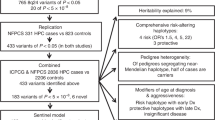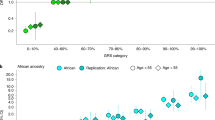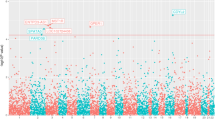Abstract
In Western countries, prostate cancer is the most prevalent cancer of men and one of the leading causes of cancer-related death in men. Several genome-wide association studies have yielded numerous common variants conferring risk of prostate cancer. Here, we analyzed 32.5 million variants discovered by whole-genome sequencing 1,795 Icelanders. We identified a new low-frequency variant at 8q24 associated with prostate cancer in European populations, rs188140481[A] (odds ratio (OR) = 2.90; Pcombined = 6.2 × 10−34), with an average risk allele frequency in controls of 0.54%. This variant is only very weakly correlated (r2 ≤ 0.06) with previously reported risk variants at 8q24, and its association remains significant after adjustment for all known risk-associated variants. Carriers of rs188140481[A] were diagnosed with prostate cancer 1.26 years younger than non-carriers (P = 0.0059). We also report results for a previously described HOXB13 variant (rs138213197[T]), confirming it as a prostate cancer risk variant in populations from across Europe.
This is a preview of subscription content, access via your institution
Access options
Subscribe to this journal
Receive 12 print issues and online access
$209.00 per year
only $17.42 per issue
Buy this article
- Purchase on Springer Link
- Instant access to full article PDF
Prices may be subject to local taxes which are calculated during checkout

Similar content being viewed by others
References
Lichtenstein, P. et al. Environmental and heritable factors in the causation of cancer—analyses of cohorts of twins from Sweden, Denmark, and Finland. N. Engl. J. Med. 343, 78–85 (2000).
Amundadottir, L.T. et al. Cancer as a complex phenotype: pattern of cancer distribution within and beyond the nuclear family. PLoS Med. 1, e65 (2004).
Ewing, C.M. et al. Germline mutations in HOXB13 and prostate-cancer risk. N. Engl. J. Med. 366, 141–149 (2012).
Kong, A. et al. Detection of sharing by descent, long-range phasing and haplotype imputation. Nat. Genet. 40, 1068–1075 (2008).
Gudmundsson, J. et al. Discovery of common variants associated with low TSH levels and thyroid cancer risk. Nat. Genet. 44, 319–322 (2012).
Gudmundsson, J. et al. Two variants on chromosome 17 confer prostate cancer risk, and the one in TCF2 protects against type 2 diabetes. Nat. Genet. 39, 977–983 (2007).
Amundadottir, L.T. et al. A common variant associated with prostate cancer in European and African populations. Nat. Genet. 38, 652–658 (2006).
Gudmundsson, J. et al. Genome-wide association study identifies a second prostate cancer susceptibility variant at 8q24. Nat. Genet. 39, 631–637 (2007).
Yeager, M. et al. Genome-wide association study of prostate cancer identifies a second risk locus at 8q24. Nat. Genet. 39, 645–649 (2007).
Haiman, C.A. et al. Multiple regions within 8q24 independently affect risk for prostate cancer. Nat. Genet. 39, 638–644 (2007).
Zheng, S.L. et al. Association between two unlinked loci at 8q24 and prostate cancer risk among European Americans. J. Natl. Cancer Inst. 99, 1525–1533 (2007).
Gudmundsson, J. et al. Genome-wide association and replication studies identify four variants associated with prostate cancer susceptibility. Nat. Genet. 41, 1122–1126 (2009).
Yeager, M. et al. Identification of a new prostate cancer susceptibility locus on chromosome 8q24. Nat. Genet. 41, 1055–1057 (2009).
Al Olama, A.A. et al. Multiple loci on 8q24 associated with prostate cancer susceptibility. Nat. Genet. 41, 1058–1060 (2009).
Crowther-Swanepoel, D. et al. Common variants at 2q37.3, 8q24.21, 15q21.3 and 16q24.1 influence chronic lymphocytic leukemia risk. Nat. Genet. 42, 132–136 (2010).
Tomlinson, I. et al. A genome-wide association scan of tag SNPs identifies a susceptibility variant for colorectal cancer at 8q24.21. Nat. Genet. 39, 984–988 (2007).
Zanke, B.W. et al. Genome-wide association scan identifies a colorectal cancer susceptibility locus on chromosome 8q24. Nat. Genet. 39, 989–994 (2007).
Haiman, C.A. et al. A common genetic risk factor for colorectal and prostate cancer. Nat. Genet. 39, 954–956 (2007).
Easton, D.F. et al. Genome-wide association study identifies novel breast cancer susceptibility loci. Nature 447, 1087–1093 (2007).
Kiemeney, L.A. et al. Sequence variant on 8q24 confers susceptibility to urinary bladder cancer. Nat. Genet. 40, 1307–1312 (2008).
Witte, J.S. Multiple prostate cancer risk variants on 8q24. Nat. Genet. 39, 579–580 (2007).
Kutyavin, I.V. et al. A novel endonuclease IV post-PCR genotyping system. Nucleic Acids Res. 34, e128 (2006).
Kong, A. et al. Fine-scale recombination rate differences between sexes, populations and individuals. Nature 467, 1099–1103 (2010).
Sulem, P. et al. Identification of low-frequency variants associated with gout and serum uric acid levels. Nat. Genet. 43, 1127–1130 (2011).
Rafnar, T. et al. Mutations in BRIP1 confer high risk of ovarian cancer. Nat. Genet. 43, 1104–1107 (2011).
Stacey, S.N. et al. A germline variant in the TP53 polyadenylation signal confers cancer susceptibility. Nat. Genet. 43, 1098–1103 (2011).
Marchini, J., Howie, B., Myers, S., McVean, G. & Donnelly, P. A new multipoint method for genome-wide association studies by imputation of genotypes. Nat. Genet. 39, 906–913 (2007).
Acknowledgements
We thank the individuals who participated in the study and whose contribution made this work possible. This project was funded in part by contract number 202059 (PROMARK) from the Seventh Framework Programme of the European Union and, in part, by the Urological Research Foundation (U01 CA089600, P50 CA90386 and P30 CA60553). The UK ProtecT study is ongoing and is funded by the Health Technology Assessment Programme (projects 96/20/06 and 96/20/99). The ProtecT trial is supported by the Department of Health, England; Cancer Research UK grant C522/A8649; Medical Research Council of England grant G0500966_ID-75466; the National Cancer Research Institute (NCRI), UK; and the Southwest National Health Service Research and Development. The biorepository from ProtecT is supported by the NCRI (ProMPT) study and Cambridge and Oxford British Medical Research Council grants from the National Institute for Health Research.
Author information
Authors and Affiliations
Contributions
The study was designed and results were interpreted by J.G., P.S., A.K., U.T., T.R. and K.S. Statistical analysis was carried out by P.S., D.F.G., G.T., J.G. and A.K. Subject recruitment, biological material collection and handling, and genotyping were supervised and carried out by J.G., B.A.A., K.R.B., S.N.S., A.S., O.T.M., S.A.G., D.N.M., H.J., H.T.H., A.J., S.B.O., J.G.J., L.T., S.N., F.F., B.T.H., Q.H., I.E.C., I.N.M., V.J., K.K.H.A., I.M.v.O., S.H.V., J.L.D., F.C.H., C.-F.N., P.K.F.C., K.-M.L., M.C.Y.N., J.R.G., G.M., W.J.C., J.I.M., G.V.E., R.B.B., E.J., D.M., D.E.N., L.A.K., U.T. and T.R. The manuscript was drafted by J.G., P.S., T.R. and K.S. All authors contributed to the final version of the paper. Principal investigators and corresponding authors for the respective replication study populations are: L.A.K., The Netherlands; J.I.M., Spain; D.M., Romania; W.J.C., Chicago; C.-F.N. and M.C.Y.N., Hong Kong; and F.C.H., J.L.D. and D.E.N., the UK.
Corresponding authors
Ethics declarations
Competing interests
The authors from deCODE Genetics declare competing financial interests: all are employees of the company, and some are shareholders.
Supplementary information
Supplementary Text and Figures
Supplementary Figures 1 and 2, Supplementary Tables 1–5 and Supplementary Note (PDF 1096 kb)
Rights and permissions
About this article
Cite this article
Gudmundsson, J., Sulem, P., Gudbjartsson, D. et al. A study based on whole-genome sequencing yields a rare variant at 8q24 associated with prostate cancer. Nat Genet 44, 1326–1329 (2012). https://doi.org/10.1038/ng.2437
Received:
Accepted:
Published:
Issue Date:
DOI: https://doi.org/10.1038/ng.2437
This article is cited by
-
Comprehensive assessment of the genetic characteristics of small for gestational age newborns in NICU: from diagnosis of genetic disorders to prediction of prognosis
Genome Medicine (2023)
-
Whole Exome Sequencing of Hemiplegic Migraine Patients Shows an Increased Burden of Missense Variants in CACNA1H and CACNA1I Genes
Molecular Neurobiology (2023)
-
Androgen receptor binding sites enabling genetic prediction of mortality due to prostate cancer in cancer-free subjects
Nature Communications (2023)
-
Characterizing prostate cancer risk through multi-ancestry genome-wide discovery of 187 novel risk variants
Nature Genetics (2023)
-
Identification of low-frequency variants of UGT1A3 associated with bladder cancer risk by next-generation sequencing
Oncogene (2021)



